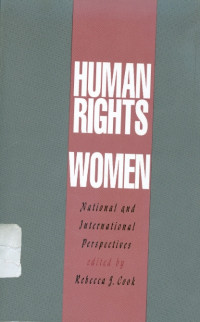
Text
Human rights of women: national and international perspectives
International human rights law is facing the challenge of being relevant and credible in improving the circumstances in which the vast majority of the world’s women live their lives. The blight of many women’s lives exposes the shortcomings that have beset international law, both in its origins and in its more modern developments. Classical international law, like the law of nature and nations, paid no attention to women as such; both nature and nations have been understood through the characteristics of men and through the motivations and strategies of men who led the affairs of nations. The twentieth-century development in. International human rights law has not yet been applied effectively to redress the disadvantages and injustices experienced by women by reason only of their being women. In this sense, respect for human rights fails to be “universal.” The reasons for this general failure to enforce women’s human rights are complex and vary from country to country. They include lack of understanding of the systemic nature of the subordination of women, failure to recognize the need to characterize the subordination of women as a human rights violation, and lack of state practice to condemn discrimination against women
Availability
| KP 1.00007 | KP 1 COO h | My Library | Available |
| KP.1.00007-01 | KP 1.COO h | My Library | Available |
Detail Information
- Series Title
-
-
- Call Number
-
KP 1 COO h
- Publisher
- Pennsylvania : University of Pennsylvania., 1994
- Collation
-
xiv, 634 hal ; 24 cm
- Language
-
English
- ISBN/ISSN
-
812215389
- Classification
-
KP 1
- Content Type
-
-
- Media Type
-
-
- Carrier Type
-
-
- Edition
-
-
- Subject(s)
- Specific Detail Info
-
-
- Statement of Responsibility
-
-
Other version/related
No other version available
File Attachment
Comments
You must be logged in to post a comment
 Computer Science, Information & General Works
Computer Science, Information & General Works  Philosophy & Psychology
Philosophy & Psychology  Religion
Religion  Social Sciences
Social Sciences  Language
Language  Pure Science
Pure Science  Applied Sciences
Applied Sciences  Art & Recreation
Art & Recreation  Literature
Literature  History & Geography
History & Geography